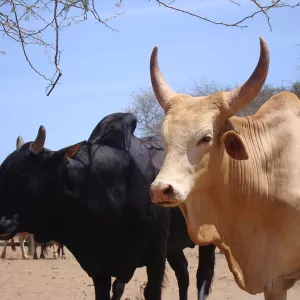Africa’s farmers to benefit from global push for low-methane, resilient livestock
On 10 September 2025, the International Livestock Research Institute (ILRI) announced the launch of a three-year, US$3.35 million project, Accelerating Reduced Emissions in Indigenous Breeds in Africa. The project is funded by the Bezos Earth Fund and the Global Methane Hub. Part of the Global Methane Genetics Initiative, the project will use cutting-edge science to help African countries breed cattle

Africa’s farmers to benefit from global push for low-methane, resilient livestock
On 10 September 2025, the International Livestock Research Institute (ILRI) announced the launch of a three-year, US$3.35 million project, Accelerating Reduced Emissions in Indigenous Breeds in Africa.
The project is funded by the Bezos Earth Fund and the Global Methane Hub.
Part of the Global Methane Genetics Initiative, the project will use cutting-edge science to help African countries breed cattle that produce less methane emissions.
By improving indigenous livestock, the initiative aims to reduce emissions while strengthening productivity, food security and climate resilience for millions of smallholder farmers across the continent.
‘Reducing methane from cattle is one of the most elegant solutions we have to slow climate change,’ said Andy Jarvis, Director of the Future of Food at the Bezos Earth Fund.
‘Thanks to collaboration with the Global Methane Hub, we’re backing an effort that uses age-old selection practices to identify and promote naturally low-emitting cattle – locking in climate benefits for generations to come.’
Livestock in Africa account for 18% of global livestock methane emissions, with cattle alone responsible for 70% of emissions on the continent.
Without intervention, these emissions could triple by 2050.
By tapping into the genetic diversity of indigenous breeds and applying cutting-edge science, the initiative will help Africa contribute to global climate goals, including the 1.5°C warming target.
‘This initiative represents an important step towards a more sustainable and productive livestock sector in Africa,’ said Raphael Mrode, principal scientist at ILRI, who will oversee scientific management of the project.
‘By integrating advanced genetics with Africa’s indigenous breeds and farmer knowledge, we can achieve meaningful reductions in methane emissions while strengthening rural livelihoods through improved productivity.’
Photo: Cattle for sale at a local market in Ukambani, Kenya (ILRI/Susan MacMillan).

